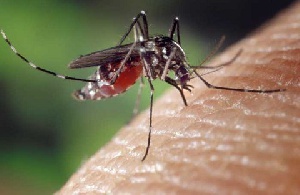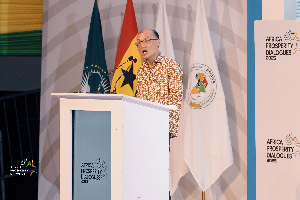The Ghana Health Service (GHS) has confirmed two additional cases of dengue fever in the Eastern Region, increasing the total number of confirmed cases to 11.
This announcement follows the detection of the virus in samples sent to the Noguchi Memorial Institute for Medical Research (NMIMR).
The Ghana Health Service (GHS) on Sunday, July 14, announced the outbreak of clinical malaria, known as dengue fever, in some districts of the Eastern Region with nine confirmed cases.
Addressing the media on Monday, Eastern Regional Health Director, Dr. Winfred Ofosu, provided updates on the outbreak.
“We are currently managing the outbreak of dengue fever in five districts: Achiase, Akyemansa, Birim Central, Birim South, and Birim North,” he said.
Dr. Ofosu also mentioned that 57 more samples are being processed, and approximately 103 suspected cases are under management.
Dengue fever, a viral hemorrhagic fever transmitted by the Aedes aegypti mosquito, presents symptoms such as high fever, severe headache, pain behind the eyes, joint and muscle pain, rash, and sometimes bleeding from mucosal surfaces. Severe cases can escalate to dengue hemorrhagic fever or dengue shock syndrome, which can be fatal without timely medical intervention.
To combat the outbreak, the Regional Health Directorate has intensified its surveillance and rapid response activities.
“We have expanded testing capabilities and deployed mobile health units to affected areas to facilitate timely medical care,” Dr. Ofosu explained.
A robust public awareness campaign is also being launched to educate the community about the importance of mosquito control and personal protection.
“This includes community meetings, educational programs in schools, and widespread distribution of informational materials,” Dr. Ofosu noted.
The Directorate is collaborating closely with local government authorities, healthcare providers, community leaders, and international health organizations to ensure a coordinated and effective response to the outbreak.
Dr. Ofosu emphasized the need for community action, urging residents to eliminate standing water around their homes, which serves as breeding grounds for mosquitoes.
“Regularly empty and clean water containers, cover water storage tanks, and ensure proper drainage around living areas,” he advised.
Residents are also encouraged to use insect repellent and wear long-sleeved shirts and long pants, particularly during dawn and dusk when mosquito activity peaks.
“If you or a family member shows symptoms of dengue fever, seek medical care immediately. Early diagnosis and treatment are crucial in preventing complications,” Dr. Ofosu stressed.
The Regional Health Director concluded by urging the public to stay informed with reliable information from the Ghana Health Service and its partners.
“We understand the anxiety this outbreak may cause, but through collective effort and vigilant action, we can effectively control the spread of dengue fever and safeguard the health of our community. Your cooperation is essential in this public health fight. Together, we can overcome this outbreak and ensure the health and safety of all residents in the Eastern Region.”
Health News of Tuesday, 16 July 2024
Source: kasapafmonline.com

















